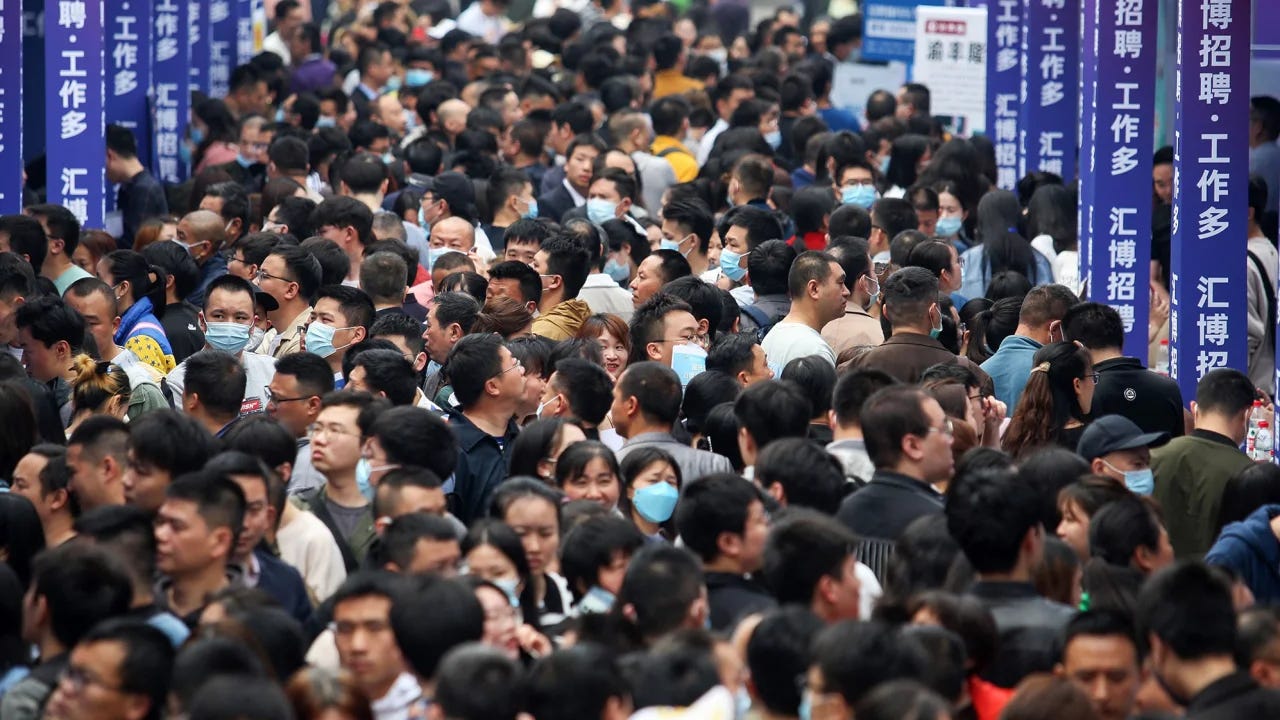No. 13 - I Almost Joined China’s Nuclear Programs
But now China is making it more difficult for the youth to climb toward success
Dear Watchers of US-China Relations:
I’m excited to announce that Wei To Think Again is now on Substack! This is my newsletter for the folks seeking to understand the nuances of US-China relations. If you liked the content before the move, I assure you that you will like it even more over here. But if you’re not yet a subscriber, please sign up below. If you are, please help us grow by forwarding the letter to a friend.
In 2012, Chinese President Xi Jinping first touted his ambition for a national rejuvenation, dubbed the “Chinese Dream.” One might argue whether there was ever one, but to China’s youth, it surely seems over now. Last month, the government stopped releasing youth unemployment rates after the official number hit a record 21%. The reality is arguably much worse. But even for those who have a job, frustration abounds: The cost of living continues to rise while the economy slows down, homeownership is increasingly unattainable, and tightened social control is strangling trivial escapes from reality like video games and cartoons.
Granted, young people in many parts of the world face hurdles on their way up in society, but that’s how upward mobility is supposed to work. A certain amount of healthy inequality functions like a ladder that motivates the young generation to climb. But for today’s China, this mechanism is fundamentally broken.
Beijing policymakers seem determined to do away with income inequality, but history shows that’s the wrong way to go. I grew up in China as the country launched into the post-Mao market reforms. I’ve seen how the healthy kind of inequality worked, and when it did, the country was full of hope and excitement.
When I Almost Chose the ‘Nuclear Option’
In my case, I did well in school—so well that I almost took part in China’s most secretive nuclear programs.
It was the spring of 2002, when I was about to graduate from high school. For 12th graders in China, spring isn’t a synonym for beach time or beer pong. Instead, their minds are most likely on the single most important event in their youth: the college entrance exam.
Since 1977, college admission in China—and thereby much of one’s future education and career—has been determined almost entirely by a nationwide entry exam that takes place every spring. One might have the combined talent of Johann Sebastian Bach and Vincent van Gogh, but it means little unless you attain a good score on the exam. Moreover, each student is allowed to apply to only a handful of schools—out of the thousands the country has. So it’s no small feat to pick schools around one’s expected performance and hope that others don’t have the same ideas.
If that sounds bad, it gets worse. Schools admit disproportionally more students from their own provinces than elsewhere, but close to half of China’s best universities are in Beijing or Shanghai. Therefore, exam-takers elsewhere face much taller odds to get into top schools. For example, Beijing’s Tsinghua University, China’s equivalent of the Massachusetts Institute of Technology, admitted 190 out of 65,000 students from the city this year—about as rare as a pregnancy resulting in twins. But it admitted just 61 out of 739,000 applicants from Guangdong Province, my hometown. That’s equivalent to the odds of being struck by lightning.
Like other aspiring souls, I wanted to beat those odds and turn my life around, and that’s when I almost stepped foot in China’s nuclear programs. In 1996, China’s nuclear industry was hitting a rough patch amid market reforms. Young people wanted to have an urban lifestyle along the eastern coast, but nuclear jobs were in the remote inland. The challenge prompted the China National Nuclear Corporation—the state-owned giant overseeing the country’s nuclear projects, civilian and military—to create a special degree program in nuclear engineering and technology at Tsinghua to produce its future employees. The deal was music to my ears: a lower score to get accepted, a scholarship that more than covered the tuition, and guaranteed, lucrative employment at one of China’s most prized enterprises.
The catch? According to an acquaintance of mine who got the degree, the students were not allowed to change majors within Tsinghua. They would be required to stay in that lucrative job for at least five years after graduation, and, due to the classified nature of their work, they would face strict travel rules even to just visit their families.
It was an easy call: My family wasn’t going to lose their only child to a faraway facility to make something that could blow up the world. Instead, I was accepted to a less prestigious program elsewhere in China. After that, I was fortunate to be able to come to America, the land I now call home, to pursue my doctorate and passion in economics—that’s the “lightning” that did strike me—and I continue to write the words you’re reading today.
When Hard Work Is Hardly Rewarded
From today’s vantage point, the 2000s was arguably the most optimistic and exciting era for many in China. The economy was growing over 10% a year throughout the decade, and the optimism was intimately felt by young people like me. The college entrance exam, though tough, was a surmountable barrier to higher education, which, in turn, was a powerful equalizer. Everyone had a shot to forever change their lives if they worked hard.
China’s youth in the late 1970s were not that lucky, and, sadly, China’s youth today aren’t either. In a recent article for the Discourse magazine, I discuss in more depth how China’s upward mobility ladder, which used to work quite well, is no longer functioning. The Chinese economy would have a real chance to come back to its trajectory of rapid growth if the government brought back fair competition and the healthy kind of inequality. But that, of course, comes with an outsized “if.”
Contact Me
Forward this to a friend, contact me with your feedback, or both!






Nice story!